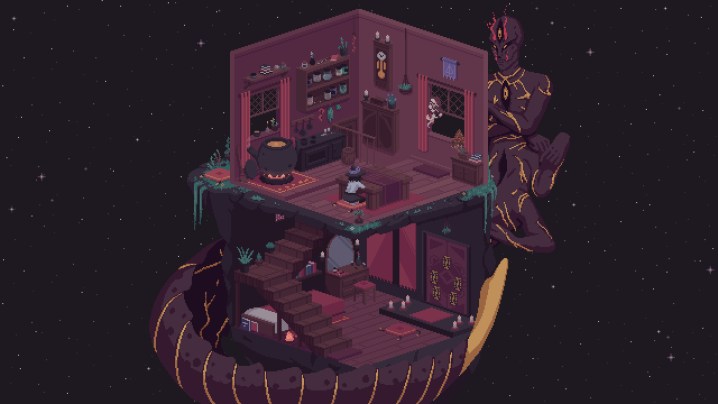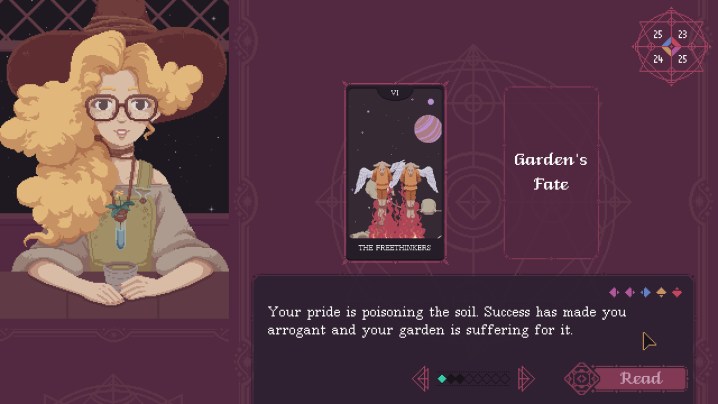I’ve played many narrative-driven games over the past decade, and I love quite a few of them, like The Wolf Among Us, Life is Strange: True Colors, and Pentiment. Still, none of them have ever had me metacontextually thinking about the genre like The Cosmic Wheel Sisterhood has.
This new game from The Red Strings Club’s Deconstructeam and Devolver Digital follows a tarot-reading Witch called Fortuna, who was exiled to house on an asteroid after predicting the fall of her coven. From there, she makes a deal with a behemoth named Abramar to craft a powerful tarot deck and slowly make her way back into the coven, reconnecting with old friends, making new ones, and forging the future of this universe.
That premise alone could have made it a solid narrative adventure game for fans of witchy things, but what elevates this indie is its surprisingly meta approach to the genre that had me thinking about the actions and consequences that have shaped my own life.
Giving the narrative game genre a tarot reading
Almost all of The Cosmic Wheel Sisterhood takes place on the small asteroid where Fortuna was exiled. It’s here where Fortuna is visited by friends, family, and Abramar. Fortuna then has to make the kind of critical decisions you’d expect from a choice-based narrative game. Some of these play out in normal conversation, but other times, these people visiting will ask Fortuna to do a reading from her deck. This deck is made up of customizable cards that players can make, and as is the case with tarot, they all have different meanings that change the response and readings that Fortuna can give to the people she’s talking to.
I’m not someone who’s into astrology and tarot. But I understand that people use it to help contextualize their actions and make sense of the world around them. I also see how those elements provide a novel way to frame choices in a narrative game, rather than defaulting to the four-choice, “this character will remember that” system that Telltale popularized. On top of that, The Cosmic Wheel Sisterhood is willing to use the inherent mechanics of its genre to wax poetic about how our choices are pivotal parts of our identity and that there are irreversible consequences to our actions.

A matter of fate
Without spoiling much, I’ll say that the narrative of The Cosmic Wheel Sisterhood gets meta when the idea that Fortuna’s readings aren’t just possibilities, but fate, arises. After this, every choice I made in the game before and thereafter had a greater impact. When we’re playing through a choice-based narrative game, the decisions we make can drastically change the world that the characters would have to deal with for the rest of their hypothetical digital lives. While most narrative games don’t dwell on that much during the story or after it concludes, The Cosmic Wheel Sisterhood makes its main character mindful of the impact she’s having, which is a form of characterization I haven’t seen in this genre before.
As a player, the fact that I know the player character knows this also increases the pressure of each decision and card pull, even if The Cosmic Wheel Sisterhood isn’t that mechanically different from its peers. To reinforce this feeling, all decisions in the adventure are final, as the game does not allow players to reload previous games. I was bit shell-shocked by this at first, especially coming off Baldur’s Gate 3, where I constantly save-scummed to get the results I wanted.
The more of The Cosmic Wheel Sisterhood I played, though, the more I wouldn’t want it any other way. The stakes of Fortuna possibly charting the future of her clan are massive, getting more and more political as the game goes on, and knowing that it’s impossible to go back on any decision you’ve made makes every choice feel that much more critical. I’ve yet to replay The Cosmic Wheel Sisterhood to test out just how different the game is from run-to-run, but this alone already gives the game a lot of replay value — though my playthrough feels final, at the same time.

An unfamiliar, but welcome feeling
While I love narrative-driven games, many of them can start to blend together after a while, especially if they’re hewing closely to the formula Telltale popularized. Nowadays, the most exciting narrative games are the ones that find a way to play around with the genre and explore new ways to make old mechanics interesting. The Cosmic Wheel Sisterhood does that on multiple levels.
Tarot is a fun way to present the game’s important choices to players, while the metatextual nature of some of the game’s themes had me thinking about the impact of every decision I’ve made and will make, both in the game and real life. That’s the kind of feeling I’ve never been able to get from things like astrology and tarot readings before. While I went into this game unsure how much it would appeal to me, I found an experience that reaffirmed things I love about the genre while delivering a captivating story about identity and consequence.
The Cosmic Wheel Sisterhood releases for PC and Nintendo Switch on August 18. There’s a free demo on Steam if you want to experience some of this adventure for yourself.
Editors' Recommendations
- The Crush House is a wacky reality TV simulator with a dark secret
- This upcoming PC game brings Lego building to the real-time strategy genre
- We played tons of games at GDC 2024. Put these ones on your wish list
- We demoed tons of indies at The Game Awards. These were our favorites
- Our favorite indies of 2023: 10 unforgettable games you need to try




